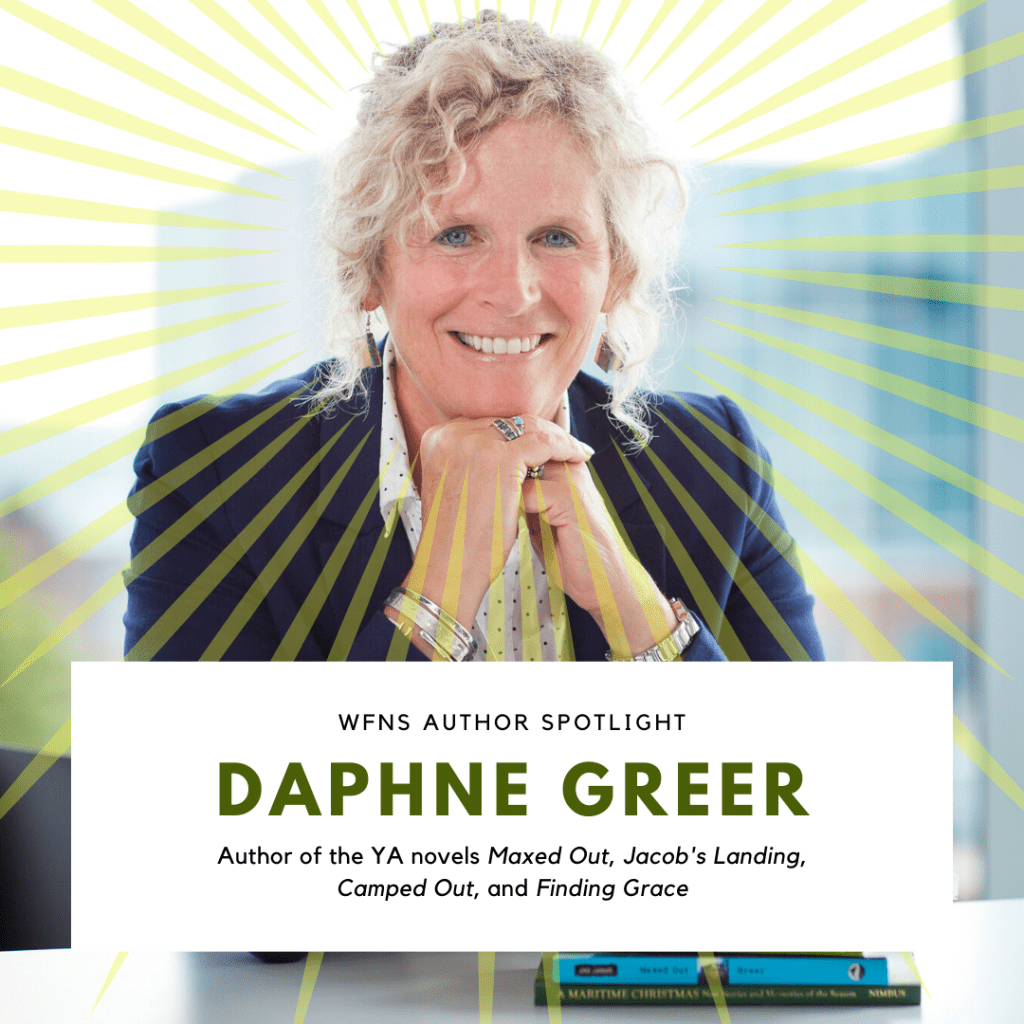
Author spotlight: Daphne Greer
Daphne Greer is an award-winning writer of young adult novels, including Maxed Out (Orca, 2012); Jacob’s Landing (Nimbus, 2015); the Maxed Out sequel, Camped Out (Orca, 2017); and her latest novel, Finding Grace (Nimbus, 2018), a finalist for the 2019 Ann Connor Brimer Award for Atlantic Canadian Children’s Literature. Currently suffering from a broken wrist, Daphne answered some questions for us while typing with only her left hand. She lives in Newport Landing, NS.
How long have you been writing? What drew you to writing in general and YA in particular?
I’ve been writing for approximately 18 years. I fell into it completely by accident when I was trying to find a book to help a family member understand his brother, who lives with autism. When I couldn’t find one that spoke to his needs, I decided to write a picture book, which later got turned into a chapter book and caught the eye of the American Library Association. Maxed Out is the title of that first book. Why YA? I guess it’s just an easy age to tap into, and it’s full of emotional highs and lows that make for a good story.
How do you deal with writer’s block?
When I have writer’s block, I try to get out of my head and allow free will to flow through. I often say a prayer before I write. I find going for a walk really clears my head. While out walking, I talk out loud about my writing problem. I know… a little out there–but usually, by the end of the walk, I have an idea around the block.
How does living in Nova Scotia influence your writing?
I find that I’m writing stories that are set in places I’m familiar with. Jacob’s Landing is set in Newport Landing, where I live. Camped Out is set at Big Cove YMCA Camp in Pictou, NS.
Do you have any writing rituals?
I’m pretty basic. I can write anywhere, anytime. I guess my only ritual is a little prayer that opens up my creative juices, and I try to just take it one moment at a time. I don’t get focused on the outcome. I usually approach every story with a challenge for myself. That challenge is ‘let’s see if I can pull this off….’
Do you remember your first encounter with the Writers’ Fed?
Yes! I signed up for a writing course with the beloved Norene Smiley. I sat around the table with my little picture book and about 12 other keen adults. After reading and listening to their feedback, I thought, ‘Oh my goodness. What have I got myself into?’ In that moment, I realized that I had a lot to learn. And I had several more weeks to go. So… the next day, I thought about the feedback and started a re write. I ditched the picture book and turned my initial idea into a chapter book. I’ll never forget what it felt like when Norene said, “I feel like giving you a hug because you listened to the feedback….” I felt I could pull it off. Kind of like the little engine that could.
What’s the most interesting place wgere you have presented to children?
When I was nominated for a Silver Birch Award, I gave several presentations in Toronto. That was a pretty neat experience. I signed my first arm that trip.
What was the last great book you read?
The last book I read was No Fixed Address by Susin Nelson. I love her writing style.
Do you have a guilty pleasure?
Guilty pleasure: chocolate. Always chocolate.
What are you working on now?
I just finished my latest draft, Jacob’s Dilemma. Its a sequel to Jacob’s Landing. It’s in the hands of my editor right now. Fingers (and toes) crossed that she likes it.
– with Linda Hudson, WFNS Arts Education Officer
